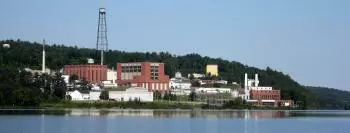
Chalk River Nuclear Laboratory (CRL), also known as Chalk River Labs and Chalk River Nuclear Laboratories (CRNL), is a premier Canadian nuclear research facility situated on the banks of the Chalk River in Ontario, approximately 180 km northwest of Ottawa. Established as a center for nuclear innovation, it has played a crucial role in Canada’s advancements in nuclear science and technology. The facility is owned by Atomic Energy of Canada Limited (AECL), a crown corporation dedicated to promoting the peaceful applications of nuclear energy.
A Legacy of Scientific Breakthroughs
Since its inception, Chalk River Laboratories has been at the forefront of both fundamental and applied nuclear research. It is renowned for the development of the CANDU (CANada Deuterium Uranium) reactor, a unique and highly efficient nuclear reactor design that has been successfully deployed both domestically and internationally. The facility has also been instrumental in advancing knowledge in metallurgy, chemistry, biology, and physics, fostering innovations that have had a lasting global impact.
The facility has been home to many distinguished scientists, including Bertram Brockhouse, a physicist who worked at CRL from 1950 to 1962. His pioneering research in neutron spectrometry earned him the Nobel Prize in Physics in 1994. Another notable figure associated with the laboratory was Sir John Cockcroft, one of its early directors, who was also a Nobel laureate recognized for his contributions to nuclear physics.
Chalk River’s Role in Nuclear Medicine
One of Chalk River Laboratories’ most significant contributions to society has been in the field of nuclear medicine. In 1957, the laboratory commissioned a nuclear reactor dedicated to the production of radioactive isotopes essential for medical diagnostics and treatments. These include:
- Thallium-201, widely used for cardiac imaging and stress tests.
- Molybdenum-99, the precursor to technetium-99m, an isotope crucial for various imaging procedures in diagnosing cancer and other medical conditions.
At its peak, Chalk River was the world's leading supplier of medical isotopes, responsible for 40% of global production. Other key producers included the Petten nuclear reactor in the Netherlands (30%) and facilities in Belgium, France, South Africa, and later, Australia. The temporary closure of Chalk River in 2009 created a significant isotope shortage, underscoring the facility’s critical role in global healthcare.
Historical Development and Contributions
The origins of Chalk River Laboratories date back to World War II, when Canadian and British nuclear scientists collaborated to establish a research center in Montreal in 1942. Operated under the National Research Council of Canada (NRC), this facility laid the foundation for nuclear science in Canada. By 1944, operations had moved to Chalk River, and in September 1945, the site became home to the first nuclear reactor outside the United States.
In 1952, the Canadian government established Atomic Energy of Canada Limited (AECL) to oversee the peaceful use of nuclear energy. Subsequently, AECL assumed full control of Chalk River Laboratories from the NRC. Over the following decades, the facility played a vital role in developing nuclear reactors for scientific, medical, and commercial applications.
Despite its focus on peaceful applications, from 1955 to 1976, Chalk River supplied approximately 250 kg of plutonium to the United States, where, according to the Canadian Coalition for Nuclear Responsibility, it was used in nuclear weapons production. However, the primary mission of Chalk River has always been the advancement of civilian nuclear technology.
The collaboration between AECL and the Ontario Hydro Commission led to the commissioning of Canada’s first nuclear power plant in 1962, located near Chalk River. This experimental reactor tested the CANDU reactor design, which later became one of Canada’s most successful technological exports.
Challenges and Controversies: The 2007 Temporary Closure
In November 2007, the NRU (National Research Universal) reactor at Chalk River was temporarily shut down for routine maintenance under the supervision of the Canadian Nuclear Safety Commission (CNSC). During the maintenance process, concerns arose regarding the facility’s resistance to seismic activity, leading to a decision to upgrade its emergency power supplies.
However, the unexpected prolonged shutdown led to a global shortage of medical isotopes, particularly technetium-99m, which is used in approximately two-thirds of nuclear medicine procedures worldwide. The crisis prompted the Canadian government to intervene, and on December 11, 2007, the House of Commons passed emergency legislation to restart the reactor for 120 days, overriding the CNSC’s decision. The law was swiftly ratified by the Senate and received royal assent the following day.
Prime Minister Stephen Harper strongly criticized the CNSC for its decision, arguing that the extended shutdown jeopardized the health and safety of thousands of Canadians who depended on nuclear medicine. The head of the CNSC, Linda Keen, was subsequently dismissed for failing to prioritize public health needs in her regulatory decisions. The NRU reactor resumed operations on December 16, 2007, but the incident spurred efforts to develop alternative, non-reactor-based methods for producing medical isotopes, such as linear accelerators.
Chalk River Today and Future Prospects
Chalk River Laboratories remains an active and vital hub for nuclear research and isotope production. While AECL continues to oversee scientific research at the facility in collaboration with the NRC, its role has evolved over the years. The focus has shifted toward developing next-generation nuclear technologies, enhancing safety protocols, and ensuring a sustainable supply of medical isotopes through innovative production methods.
As Canada transitions toward newer and more sustainable nuclear technologies, Chalk River’s legacy of excellence in research and innovation continues to shape the global nuclear landscape. The laboratory remains a cornerstone of Canada’s nuclear industry, contributing to medical advancements, energy development, and scientific discoveries that benefit humanity as a whole.